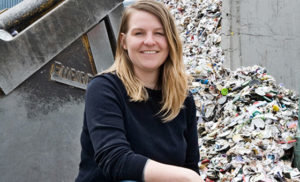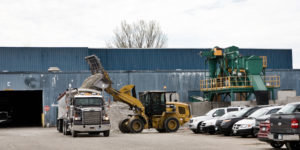 Community engagement director Katrina Lund said, “It’s important to remember to reduce, re-use AND recycle.” (Photo by Margie O’Loughlin)[/caption]
Community engagement director Katrina Lund said, “It’s important to remember to reduce, re-use AND recycle.” (Photo by Margie O’Loughlin)[/caption] By MARGIE O’LOUGHLIN
Eureka Recycling is one of only a handful of non-profit recycling facilities across the country, and they’re a zero waste organization, too.
They process an average of 400 tons of recyclable materials from the Twin Cities metro area daily. Katrina Lund, director of community engagement, emphasized, “That’s 400 tons that aren’t being burned in incinerators every day.”
Their mission is to demonstrate that waste is preventable. This impacts the way they run their recycling program – everything from how they market their recyclables to how they pay their employees.
Located in Northeast Minneapolis, Eureka’s programs are designed to help individuals, organizations, and communities understand the significance of zero waste, and to provide the resources and education needed to achieve zero waste goals.
On Saturday, June 1, Eureka will host its first ever open house for St. Paul and Minneapolis residents from 9 a.m. to 1 p.m.
Facility tours will be offered on the half hour during these times. Taking a tour helps people reckon with how huge quantities of recyclable material are collected, separated, and bundled – all at very high speeds.
In this time of change in the recycling industry, it’s important to understand what can and can’t be recycled in a MRF (materials recovery facility) like Eureka.
Co-president Lynn Hoffman said, “It’s pretty simple. We‘re designed to handle food and beverage containers, though we end up with all kinds of things like garden hoses, plastic toys, chain link fencing, and propane tanks.”
When St. Paul switched to single stream recycling a few years ago, the quantity of recyclables collected went up, but the quality went down.
 Photo by Margie O'Loughlin
Photo by Margie O'LoughlinHoffman and Lund made the following suggestions for people who want to recycle better:
• Do not put recyclables into plastic bags. Dump them directly into the blue cart.
• Make sure that containers being recycled are empty. Get them reasonably clean, too.
• Just because something is recyclable, doesn’t mean it’s recyclable in the blue cart. For example, plastic bags are recyclable – but not through Eureka. Search www.plasticfilmrecycling.org by zip code to learn where to bring them. CUB, Target and Walmart on University Ave. in the Midway are all drop-off spots for plastics such as product wrap, newspaper and bread bags, and more. The bins are located near the entrance of each store.
• Lithium batteries are now frequently embedded in greeting cards. The batteries are hazardous and should not be put in with recycling.
• Batteries, propane tanks, and electronics should be taken to a hazardous waste site.
• If there’s a choice between products packaged in plastic or glass, choose glass. Glass can be recycled infinitely; a plastic bottle will likely be turned into decking, and from there it can’t be recycled into anything else; plastic bottles can only be recycled once.
Lund explained that most of the trash collected in the Twin Cities ends up being burned in an incinerator in downtown Minneapolis. She said, “One of the myths in this industry is that incineration is cheaper than recycling. The real costs of incineration go well beyond a dollar amount. You have to figure in the invisible (and unknown) costs of asthma and other respiratory illnesses, carcinogens released into the air, and the effect on climate change.”
Hoffman concluded, “We have a consumption problem in this country. Forty-two percent of the CO2 emissions in the US come from the production, consumption, and disposal of consumer products. What can we do about that? Use less, be content with what you have, choose durable options. People get overwhelmed and think that their individual actions don’t add up – but they do.”
Eureka Recycling is located at 2828 Kennedy Street NE, Minneapolis 55413.There’s no need to RSVP for the open house, but you can reserve a spot for a specific tour time at www.eurekarecycling.org. Enjoy snacks and coffee (in compostable cups), and photo opportunities with bales of aluminum cans and mixed plastics. Public tours are also available each Wednesday at 9 a.m. by reservation.
Comments
No comments on this item Please log in to comment by clicking here